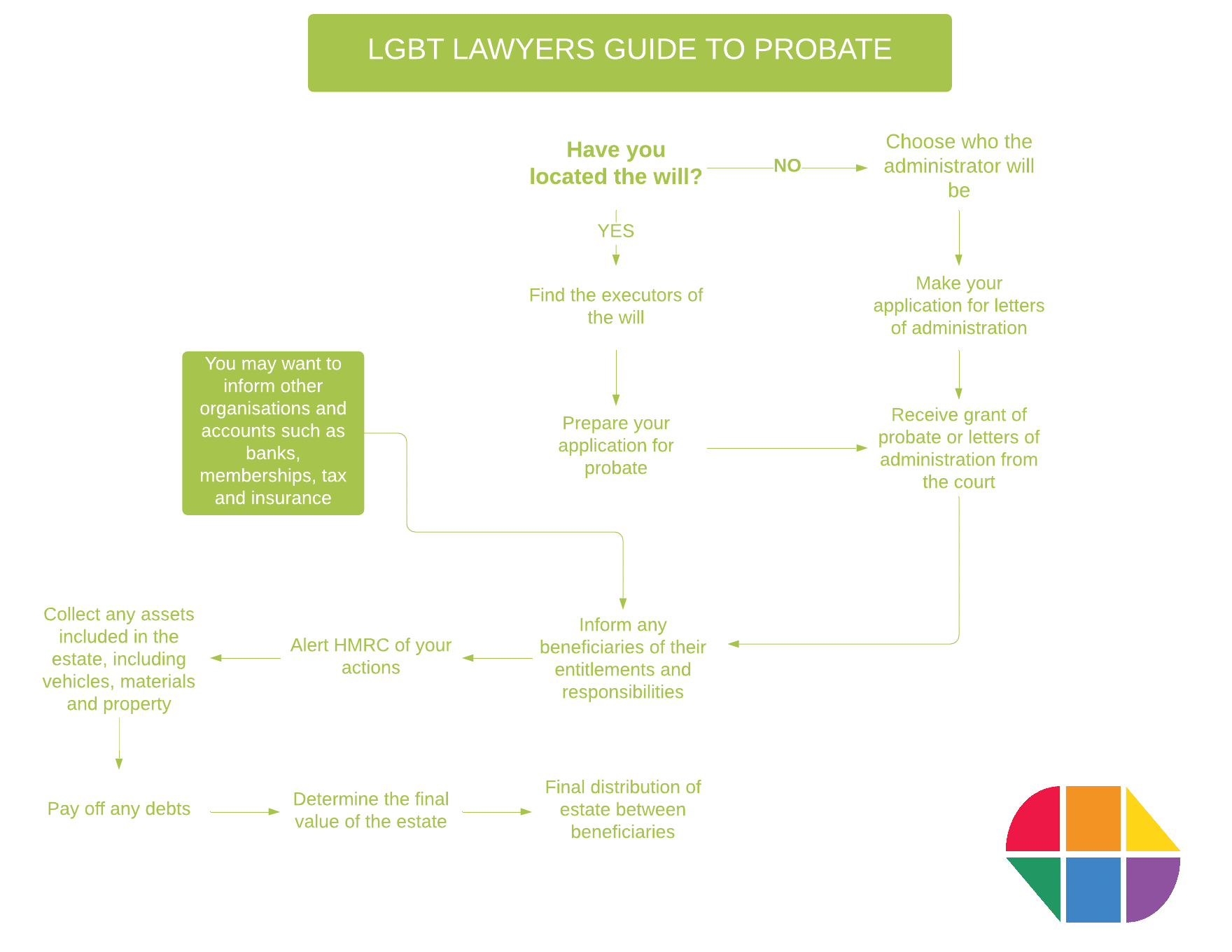Probate Process | Read Time 8-10 Minutes.
What is the probate process?
Probate, put simply, is the legal process of handling a person’s estate when they have passed away. This generally includes property, finances and assets (possessions). Normally, the person who is named the “executor of the will” is the person who handles the deceased’s probate.
The probate process can be lengthy and complicated and no one case is the same. Probate varies massively in price and execution time, and primarily depends on the size of the estate.
But don’t worry!
LGBT Lawyers has drafted a simple 5 step guide to the probate process and will show you what to expect from start to finish.

5 Simple steps to completing the probate process
1) Locate the death certificate
The first step in the probate process is locating the deceased’s death certificate. In most cases, it’s beneficial to have multiple death certificates (one per financial area that they handled while they were alive.) Be careful here, as usually photocopies aren’t accepted, so be sure to obtain the original documents.
After you’ve been given the relevant documents by the medical services, you’ll have to register the person’s death at the local registry office in order to obtain the certificates. Once this has been completed, the relevant registry office will then inform The Government of the individual’s death. They will report this death to services such as the DVLA, the passport office and any tax authorities.
2) Find the deceased’s will
Once the death has been registered you can start locating the will.
In most cases the will is kept safely with a lawyer or solicitor. This step is important because the will locates the listed executor, the person who has been named by the deceased to handle their estate.
Did you know…
If you can’t locate the will, then the individual is said to have died in a state of intestacy. If this happens, then the estate becomes the responsibility of any next of kin. Intestacy is common among LGBT individuals, as LGBT people are less likely to get married. Because of this, LGBT people often don’t feel the need to write a will, and therefore have been reported as more likely to die intestate.
3) Time to find a lawyer
The next step in the probate process will be to find a probate lawyer. They can make sure that the legal side of probate and administering the estate is executed properly. It’s important to understand that this step of probate can only be completed once you have found the will and the death certificate(s).
Your lawyer will then be able to asses the estate and gain an understanding of any assets and liabilities that have been left behind. This step is where the process will vary for each person. Generally, probate can vary from 6 months to 2 years, depending on the size of the estate, how many assets they have, if they have any assets or businesses abroad and how much property is involved.
4) apply for the grant of probate
Your lawyer can then complete a form that applies for a grant of probate. They will also apply for an IHT, which is a document that states how much inheritance tax will be owed.
These documents will be sent off with the original death certificate. After HMRC accept the valuation, you must then pay in any inheritance tax before you can receive the grant of probate. This will come from the deceased’s bank account or through property if that’s where any assets are held.
did you know…
In some cases you may be able to find the will, but the will might not clearly state who the executor is. In most of these cases, the responsibility will then fall to a primary named beneficiary in the will. This person will then be able apply for a “Grant of Letters of Administration With Will Annexed.” This will allow the beneficiary to act as the executor.
5) Finally, Administer the estate
Your lawyer will then distribute all of the assets as directed to do so in the will. This can be done once probate has been granted and inheritance tax has been paid. A copy of the grant of probate will need to be sent to the deceased’s bank and then the money will go into a separate “executors account.”
After this is done, you as the executor are free to make appropriate donations to the beneficiaries.

Most frequently asked questions
What if there is something wrong with the estate?
Once probate has been completed, there is a 12-year window when a claim can be made against the estate. This is known as a contentious will or contentious probate. The most common grounds for contesting a will/probate are:
– The will has not been drafted or completed properly
– If the deceased was too incapacitated to competently write the will
– The will was completely different to any previously drafted wills
– If the deceased was pressured into writing the will
How long does probate take?
Probate can be a really lengthy process. Applying for certificates and forms and then subsequently sending them on again can seem to take forever.
A simple estate will typically take around 6 months for probate to be completed. The length of probate doesn’t vary based on how much money the deceased has. The variants that lead an individual to having a “complex estate” are things like trusts, business accounts overseas and any property/ assets overseas. An estate like this could even take up to 2 years to complete.
How much does probate cost?
It’s almost impossible to say how much probate will cost because it entirely depends on the estate in question. Each probate lawyer will have a full guide of probate fees relevant to the work involved in the probate process.
As a very general example, a simple probate case could cost between £4,000- £5,000 for everything inclusive. It’s really difficult to put a price on probate for a complex estate. We generally say its an upwards of £8,000, but cases of really complex estates have been known to hit £30,000 if the estate is mainly overseas.
So why do I need a lawyer? Can’t I complete the process alone?
By all means, you are welcome to complete the probate process without legal support. But using the services of a lawyer can be really beneficial for you in the long run.
Going through probate can be a long and arduous process, especially if you’re a little unsure of what you’re doing. And then there’s the issue of contentious probate, which could come later down the line.
Probate can involve extensive administration work to find and value the estate, to measure the inheritance tax due on it and to subsequently distribute the assets. The function of a lawyer during probate is to complete all the difficult work for you – such as locating extensive financial records and finding beneficiaries.
Furthermore, if you encounter any difficulties with the will or estate, or the validity of the will is put into question, its essential to have a lawyer on your side to tackle the difficult elements of probate.
On top of that, probate can be really emotional for everyone who has been left behind. The stress of trying to grieve and handle the deceased’s estate can be really daunting.
If you need any more information about the planning your estate for when you pass or just fancy a chat with an experienced probate lawyer, get in touch with us today and we will connect you with the best support for your case.




0 Comments